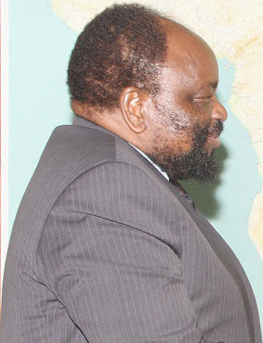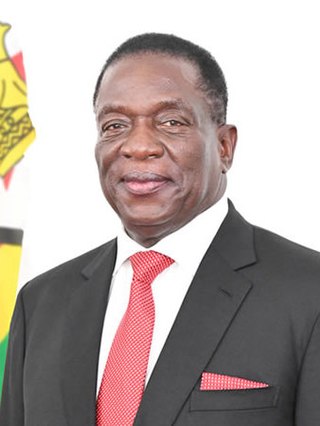Related Research Articles

Roy Leslie Bennett was a Zimbabwean politician and member of the British South Africa Police. He was also a member of the House of Assembly of Zimbabwe for the seat of Chimanimani,where he was affectionately known as Pachedu. He was the Treasurer of the Movement for Democratic Change party led by Morgan Tsvangirai and a member of the Senate of Zimbabwe. He was set to become the Deputy Minister of Agriculture of Zimbabwe until President Robert Mugabe refused to swear him in.
Isaak Stanislaus Gorerazvo Mudenge was a Zimbabwean politician who served in the government of Zimbabwe as Minister of Foreign Affairs from 1995 to 2005 and as Minister of Higher Education from 2005 to 2012.

Simbarashe Simbanenduku Mumbengegwi is a Zimbabwean politician and diplomat currently serving as Minister of State for Presidential Affairs and Monitoring Government Programmes. Previously he was acting Foreign Minister for a few days following the resignation of former President Robert Mugabe He had previously served as Zimbabwe's Minister of Foreign Affairs from 2005 to 2017. From October to November 2017,he was Minister of Macro-Economic Planning and Investment Promotion.

Saviour Kasukuwere is a Zimbabwean politician who served in the government of Zimbabwe as Minister of Local Government,Rural Development and National Housing between October and November 2017. He was also the ZANU–PF party's national political commissar until December 2017. Before that he was Minister of Youth Development,Indigenisation and Empowerment,and Minister of the Environment,Water and Climate. In October 2020,the Zimbabwe government sought Kasukuwere's extradition after issuing a warrant for his arrest. It was revealed that Kasukuwere was among loyalists of former President Robert Mugabe who fled to South Africa before their criminal trials could be completed.

Emmerson Dambudzo Mnangagwa is a Zimbabwean politician who is serving as President of Zimbabwe since 24 November 2017. A member of ZANU–PF and a longtime ally of former President Robert Mugabe,he held a series of cabinet portfolios and was Mugabe's Vice-President until November 2017,when he was dismissed before coming to power in a coup d'état. He secured his first full term as president in the disputed 2018 general election. Mnangagwa was re-elected in the August 2023 general election with 52.6% of the vote.
Sydney Tigere Sekeramayi is a Zimbabwean politician who served in the government of Zimbabwe as Minister of Defence between 2013 and 2017. He has been a minister in the Cabinet since independence in 1980,serving as Minister of Defence from 2001 to 2009 and Minister of State Security from 2009 to 2013.
Patrick Antony Chinamasa is a Zimbabwean politician who served in the government of Zimbabwe as the minister of various cabinet ministries. Previously he served as the Minister of Finance and Investment Promotion and the Minister of Justice,Legal and Parliamentary Affairs.
Simbarashe Herbert Stanley Makoni is a Zimbabwean politician and was a candidate for the March 2008 presidential election against incumbent Robert Mugabe. He was Minister of Finance and Economic Development in President Robert Mugabe's cabinet from 2000 to 2002. He faced strong opposition during the Economic Change in Zimbabwe in the early 2000s as his policies contradicted those of the rest of the ZANU-PF party.
Obert Moses Mpofu is a Zimbabwean politician,who served as Minister of Home Affairs from 2017 to September 2018. Previously he was Minister of Macro-Economic Planning and Investment Promotion;Minister of Industry and International Trade;Minister of Mines and Mining Development;and Minister of Transport and Infrastructure Development. The Cabinet of Zimbabwe was later dissolved on 27 November 2017. He was reappointed as Minister of Home Affairs in Mnangagwa's first cabinet on 30 November 2017. The Culture portfolio was added to his ministry. Mpofu was later removed from the Zimbabwe cabinet in September 2018.

Kembo Dugish Campbell Muleya Mohadi is a Zimbabwean politician and Vice-President of Zimbabwe since 8 September 2023. He previously served in the same role from 28 December 2017 to 1 March 2021,when he resigned. He briefly served as the Minister of Defence,Security and War Veterans in 2017. Previously he was Minister of State for National Security in the President's Office from 2015 to 2017 and Minister of Home Affairs from 2002 to 2015.

Ignatius Morgen Chiminya Chombo is a Zimbabwean politician who was Finance Minister of Zimbabwe in 2017. Previously he has served in the Cabinet of Zimbabwe as Minister of Home Affairs from 2015 to 2017,Minister of Local Government,Public Works and Urban Development from 2000 to 2015.
Joseph Mtakwese Made was a Zimbabwean politician who served as Minister of Agriculture.
Ambrose Mutinhiri is a Zimbabwean politician,formally served as the Minister of Youth Development and Employment Creation. A retired army commander and brigadier,he was appointed as Minister of Youth Development,Gender and Employment Creation on February 9,2004. He was trained in Russia during the Rhodesian Bush War. He is known for training the best calibre of soldiers during this period,even the late General Solomon Mujuru testified that he was trained by Mutinhiri.
Webster Kotiwani Shamu is a Zimbabwean politician and former Minister of Mashonaland West Provincial Affairs who was fired by President Emmerson Mnangagwa on 21 May 2018. He previously served as Minister of Information and Publicity,and as Minister of State for Policy Implementation. He is a member of parliament representing the Chegutu constituency. The Cabinet of Zimbabwe was later dissolved on 27 November 2017.
Zambian President Levy Mwanawasa called an emergency meeting of SADC leaders for 12 April during the 2008 Zimbabwe presidential election to discuss the post-election impasse. According to Mwanawasa,Zimbabwe's "deepening problems" meant that the issue needed to be "dealt with at presidential level". Jacob Zuma,meanwhile,said that he thought results should have already been announced,and he described the failure to release them as "unprecedented".

The 2008–2009 Zimbabwean political negotiations between the opposition Movement for Democratic Change,its small splinter group,the Movement for Democratic Change –Mutambara,and the ruling Zimbabwe African National Union –Patriotic Front were intended to negotiate an end to the partisan violence and human rights violations in Zimbabwe and create a framework for a power-sharing executive government between the two parties. These negotiations followed the 2008 presidential election,in which Mugabe was controversially re-elected,as well as the 2008 parliamentary election,in which the MDC won a majority in the House of Assembly.

The 7th Parliament of Zimbabwe was a meeting of the Zimbabwean Parliament,composed of the Senate and the House of Assembly. It met in Harare over five sessions from 25 August 2008 to 27 June 2013. Its membership was set by the disputed 2008 Zimbabwean general election,which resulted in a ZANU–PF majority in the Senate and Movement for Democratic Change –Tsvangirai control of the House of Assembly. Political negotiations resulted in the 2009 Government of National Unity,a coalition government composed of ZANU–PF,the MDC–T,and the MDC–M.
Joel Gabuza was the Zimbabwe Minister of Water Resources and Development from 2009 during the Government of National Unity formed between the ruling ZanuPF and the opposition,and held office until 2013 when a new cabinet was appointed,and Oppah Muchinguri-Kashiri was appointed as the new Minister of Water and Climate. He is the Member of House of Assembly for Binga (MDC-T).
The Ministry of Public Service,Labour and Social Welfare is a government ministry,responsible for labour relations and welfare in Zimbabwe. Clever Nyathi was the incumbent minister until 2 December while the Joshua Malinga was appointed as the deputy minister for the portfolio of Social Welfare. Nyathi was replaced by ZANU-PF lawmaker Petronella Kagonye. It oversees National Social Security Authority. On November 27,2017,Emmerson Mnangagwa,who succeeded ousted President Robert Mugabe following the 2017 Zimbabwe coup d'état,announced the dissolution of the Zimbabwe Cabinet,leaving only Patrick Chinamasa and Simbarashe Mumbengegwi as acting ministers of Finance and Foreign Affairs respectively.

General elections were held in Zimbabwe on 29 March 2008 to elect the President and Parliament. Because of Zimbabwe's dire economic situation,the elections were expected to provide incumbent President Robert Mugabe with his toughest electoral challenge to date. Mugabe's opponents were critical of the handling of the electoral process,and the government was accused of planning to rig the election. Human Rights Watch said that the election was likely to be "deeply flawed."
References
- ↑ "Mugabe rewards loyalists in new Cabinet", New Zimbabwe, 9 February 2004.
- ↑ Michael Hartnack, "Mugabe announces new cabinet", Associated Press, 18 April 2005. "Dispatch Online – Your premier Eastern Cape news site". Archived from the original on 30 April 2005. Retrieved 8 February 2008.
{{cite web}}: CS1 maint: bot: original URL status unknown (link) - ↑ "MP's sworn in, new ministers appointed", SADOCC, 16 April 2005.
- ↑ David Blair, "Mugabe 'conjures up' winning votes" [ dead link ], Daily Telegraph, 8 April 2005.
- ↑ "Mugabe retains old guard during shuffle", Reuters, 7 February 2007.
- ↑ "Zimbabwe: Zanu-PF Names Poll Candidates", The Herald, 15 February 2008.
- ↑ "Zimbabwe senate election results" Archived 29 August 2008 at the Wayback Machine , Newzimbabwe.com.
- ↑ "Cabinet sworn in amid chaotic scenes" Archived 14 February 2009 at the Wayback Machine , Newzimbabwe.com, 13 February 2009.
- ↑ "Mnangagwa dissolves cabinet, Chinamasa appointed Acting Finance Minister". 27 November 2017.
- ↑ Blocking property of persons undermining democratic processes or institutions in Zimbabwe